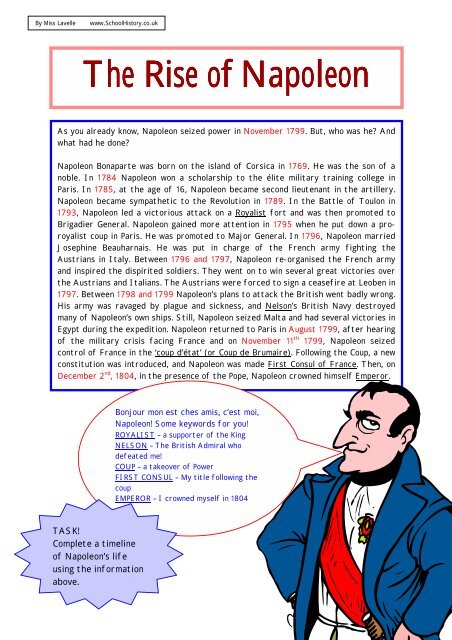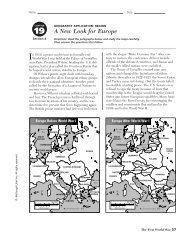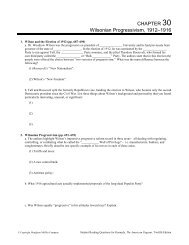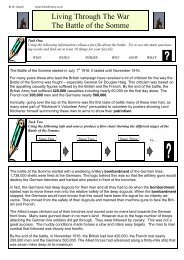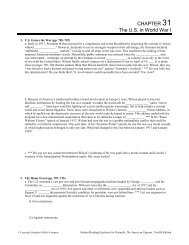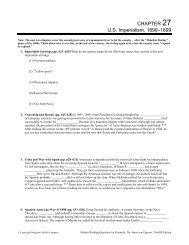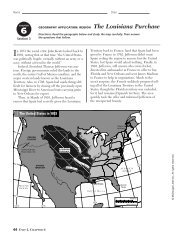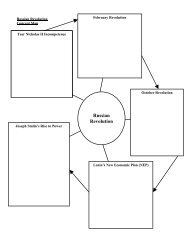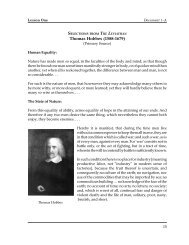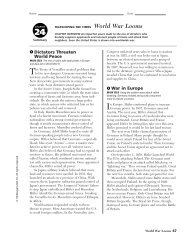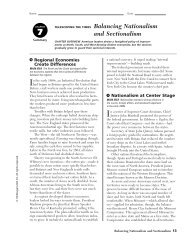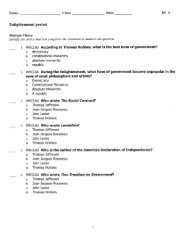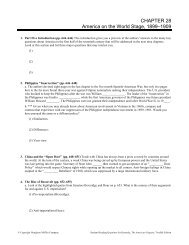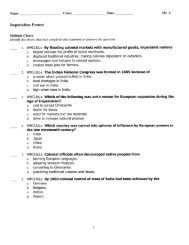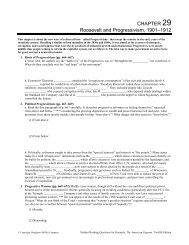The Rise of Napoleon The Rise of Napoleon
The Rise of Napoleon The Rise of Napoleon
The Rise of Napoleon The Rise of Napoleon
Create successful ePaper yourself
Turn your PDF publications into a flip-book with our unique Google optimized e-Paper software.
By Miss Lavellewww.SchoolHistory.co.uk<strong>The</strong> <strong>Rise</strong> <strong>of</strong> <strong>Napoleon</strong>As you already know, <strong>Napoleon</strong> seized power in November 1799. But, who was he? Andwhat had he done?<strong>Napoleon</strong> Bonaparte was born on the island <strong>of</strong> Corsica in 1769. He was the son <strong>of</strong> anoble. In 1784 <strong>Napoleon</strong> won a scholarship to the élite military training college inParis. In 1785, at the age <strong>of</strong> 16, <strong>Napoleon</strong> became second lieutenant in the artillery.<strong>Napoleon</strong> became sympathetic to the Revolution in 1789. In the Battle <strong>of</strong> Toulon in1793, <strong>Napoleon</strong> led a victorious attack on a Royalist fort and was then promoted toBrigadier General. <strong>Napoleon</strong> gained more attention in 1795 when he put down a proroyalistcoup in Paris. He was promoted to Major General. In 1796, <strong>Napoleon</strong> marriedJosephine Beauharnais. He was put in charge <strong>of</strong> the French army fighting theAustrians in Italy. Between 1796 and 1797, <strong>Napoleon</strong> re-organised the French armyand inspired the dispirited soldiers. <strong>The</strong>y went on to win several great victories overthe Austrians and Italians. <strong>The</strong> Austrians were forced to sign a ceasefire at Leoben in1797. Between 1798 and 1799 <strong>Napoleon</strong>’s plans to attack the British went badly wrong.His army was ravaged by plague and sickness, and Nelson’s British Navy destroyedmany <strong>of</strong> <strong>Napoleon</strong>’s own ships. Still, <strong>Napoleon</strong> seized Malta and had several victories inEgypt during the expedition. <strong>Napoleon</strong> returned to Paris in August 1799, after hearing<strong>of</strong> the military crisis facing France and on November 11 th 1799, <strong>Napoleon</strong> seizedcontrol <strong>of</strong> France in the ‘coup d’état’ (or Coup de Brumaire). Following the Coup, a newconstitution was introduced, and <strong>Napoleon</strong> was made First Consul <strong>of</strong> France. <strong>The</strong>n, onDecember 2 nd , 1804, in the presence <strong>of</strong> the Pope, <strong>Napoleon</strong> crowned himself Emperor.Bonjour mon est ches amis, c’est moi,<strong>Napoleon</strong>! Some keywords for you!ROYALIST – a supporter <strong>of</strong> the KingNELSON – <strong>The</strong> British Admiral whodefeated me!COUP – a takeover <strong>of</strong> PowerFIRST CONSUL – My title following thecoupEMPEROR – I crowned myself in 1804TASK!Complete a timeline<strong>of</strong> <strong>Napoleon</strong>’s lifeusing the informationabove.
<strong>Napoleon</strong> sufferedfrom Frohlich’sDisease, which causedhis sex organs toshrink!!SOURCE 1. “Frenchmen, withouta doubt, you will see in what I didthat I am a soldier who supportsliberty and am a citizen who isdevoted to the republic.” – From atranslation <strong>of</strong> the ‘<strong>of</strong>ficial’ version<strong>of</strong> the coup, issued throughoutFrance.Both <strong>Napoleon</strong>’s appointment asFirst Consul <strong>of</strong> France and hiscoronation were put to theFrench People in a Referendum(vote). <strong>The</strong> French People hadhad enough <strong>of</strong> the politicalquarrels in France and nowlooked for strong leadership in<strong>Napoleon</strong>. Many observersabroad found it odd thatFrance had agreed to have anEmperor so soon afterremoving a King. Many people inEuropean Monarchies (such asAustria and Britain) had notsupported the Revolution andtherefore did not like<strong>Napoleon</strong>. <strong>The</strong>y were morecritical <strong>of</strong> the new Emperor <strong>of</strong>France.Source 2.Anotherversion <strong>of</strong>the Coup byan Englishartist. <strong>The</strong>captionreads: ‘<strong>The</strong>CorsicanCrocodileabolishesthe Council<strong>of</strong> Frogs.’ASOURCE 4. “He stammeredso much… it was clear hisplace was before soldiersrather than before anassembly.” From the memoirs<strong>of</strong> Bourrienne, <strong>Napoleon</strong>’ssecretary. <strong>The</strong> two later fellout.CSOURCE 3. <strong>Napoleon</strong>’s Coronation by the French painter David. Davidwas a keen supporter <strong>of</strong> the Revolution.B1) Why did some people think it strange that the French people accepted <strong>Napoleon</strong> as their new Emperor?2) Compare sources 1 and 3. How do <strong>Napoleon</strong>’s words in the ‘<strong>of</strong>ficial’ version <strong>of</strong> the coup contradict thescene pictured in source 3?3) Look at source 2. Does it support or criticise the coup? Explain your answer.4) Identify the people marked A, B and C in source 3. Why might we not trust this painting completely?5) What impression <strong>of</strong> <strong>Napoleon</strong> does each <strong>of</strong> these sources give you?BONUS! You are <strong>Napoleon</strong>. You have taken control and crowned yourself Emperor. What steps are younow going to take to make sure you keep your position in France?BONUS 2! Ask your teacher for a blank factfile. Use your knowledge <strong>of</strong> <strong>Napoleon</strong>’s life to fill it in. THISCAN BE DONE FOR HOMEWORK!


